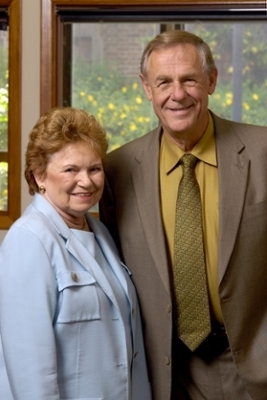
 Founders — Steve and Donna Shepard
Founders — Steve and Donna ShepardThe Shepard Academic Resource Center is named for its benefactors, University of Portland Board of Regents member Steve Shepard, and his wife Donna. During the University's Defining Moment Campaign, the Shepards provided a generous gift in order to allow for the creation of a center aimed at helping first-year students in the transition to college. Since then, the center has transformed into a service for all students.
Steve Shepard graduated from the University of Portland with a degree in business in 1958, and has been a member of the Board of Regents since 1989. For nearly thirty years, Steve has been an active member of the Oregon Estate Planning Council, and is a member of the steering committee of the Albert Starr Academic Center for Cardiac Surgery at Providence St. Vincent Medical Center in Portland.
Steve and his wife Donna have two daughters, Jennifer and Stephanie, and live in Lake Oswego, Oregon.
The vision of the SARC is to be fully present to the university community as a vital and relevant academic resource and partner. We strive to provide an environment of safety, honesty and authenticity in every student relationship.
The purpose of the SARC is to unlock and make accessible academic, social, and cultural learning potential in order for students to witness, serve, and influence a complex and changing world.
Our mission is to join students in their learning process through outreach, mentoring, coaching, and modeling. We nurture and challenge students to develop and practice learning strategies and self-advocacy skills, access the UP culture and resources, and realize their unique potential.
University of Portland
5000 N. Willamette Blvd.,
Portland, Oregon 97203-5798
503.943.8000
This website uses cookies to track information for analytics purposes. You can view the full University of Portland privacy policy for more information.
